The 6th International Conference Features Keynote Speakers Sir Liam Donaldson and Leilani Schweitzer
|

The 6th International Conference on Patient- and Family-Centered Care ~ Partnerships for Quality and Safety, August 6 – August 8, 2014, in Vancouver, British Columbia, Canada, will showcase exemplary programs that promote collaboration and partnership with patients and families to improve safety, quality, and the experience of health care.
IPFCC announced the lineup of many featured speakers for the International Conference in the March Pinwheel Pages. Below is more information about two of the plenary speakers:
![Pic_SirLiamDonaldson[1]](./issue69_files/9eed6d21909d4b5e98d75adc60287857.jpg) IPFCC is delighted to welcome as a keynote speaker, Sir Liam Donaldson, Chair in Health Policy at Imperial College London and Chancellor of Newcastle University. Sir Liam is recognized as an international champion of patient safety and public health. He is the World Health Organization’s Envoy for Patient Safety and Chairman of the Independent Monitoring Board for the Polio Eradication Programme. He was the Foundation chair of the World Health Organization World Alliance for Patient Safety, launched in 2004, and is a past Vice-Chairman of the World Health Organization Executive Board. Sir Liam served as the Chief Medical Officer for England, and the United Kingdom's Chief Medical Adviser, from 1998-2010. Included among Sir Donaldson’s many awards are a Knighthood in 2002, 15 honorary degrees from British universities, the Gold Medal of the Royal College of Surgeons of Edinburgh, and the 2006 Picker Award of Excellence in the Advancement of Patient-Centered Care. IPFCC is delighted to welcome as a keynote speaker, Sir Liam Donaldson, Chair in Health Policy at Imperial College London and Chancellor of Newcastle University. Sir Liam is recognized as an international champion of patient safety and public health. He is the World Health Organization’s Envoy for Patient Safety and Chairman of the Independent Monitoring Board for the Polio Eradication Programme. He was the Foundation chair of the World Health Organization World Alliance for Patient Safety, launched in 2004, and is a past Vice-Chairman of the World Health Organization Executive Board. Sir Liam served as the Chief Medical Officer for England, and the United Kingdom's Chief Medical Adviser, from 1998-2010. Included among Sir Donaldson’s many awards are a Knighthood in 2002, 15 honorary degrees from British universities, the Gold Medal of the Royal College of Surgeons of Edinburgh, and the 2006 Picker Award of Excellence in the Advancement of Patient-Centered Care.
 Joining Sir Liam in the opening plenary session will be Leilani Schweitzer. Leilani did not choose a career in health care, it chose her. Nearly nine years ago, her son, Gabriel, died after a series of medical mistakes. Now she works in risk management at the same hospital where those errors occurred. As a Patient Liaison for Stanford University Hospital & Clinic’s Risk Management, Leilani uses her own experience with medical errors to navigate between the often insular, legal, and administrative sides of medical error and the emotional side of the patient and family experience. Leilani’s work at Stanford gives her a unique view of the importance and complex realities of disclosure and apology. Joining Sir Liam in the opening plenary session will be Leilani Schweitzer. Leilani did not choose a career in health care, it chose her. Nearly nine years ago, her son, Gabriel, died after a series of medical mistakes. Now she works in risk management at the same hospital where those errors occurred. As a Patient Liaison for Stanford University Hospital & Clinic’s Risk Management, Leilani uses her own experience with medical errors to navigate between the often insular, legal, and administrative sides of medical error and the emotional side of the patient and family experience. Leilani’s work at Stanford gives her a unique view of the importance and complex realities of disclosure and apology.
The conference is offering a great lineup of speakers, more than 90 breakout sessions, 60 posters, unparalleled networking opportunities, and a first-rate exhibit hall. IPFCC is seeking continuing education credits for nurses, social workers, physicians, child life specialists, and health educators.
Register Now for this important event.
With leadership support from:
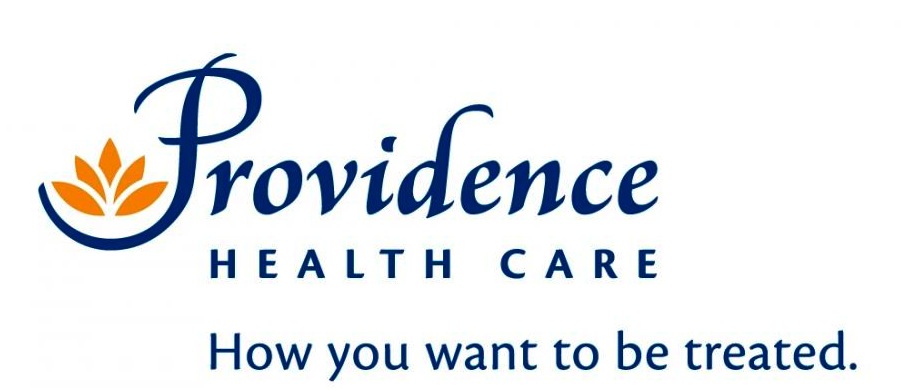
And support from our Program Partner:

Important Hotel information
The Conference will be held at The Westin Bayshore, Vancouver, British Columbia, Canada. The hotel is holding a limited number of rooms for conference participants at the group rate. The special group rate will be in effect three days before and after the conference to facilitate extra time for participants to enjoy Vancouver. The room block will sell out early, so make your reservations well before the July 7 deadline. Find more information on how to book a room at the special IPFCC rate.
Come to Vancouver Early and Stay Late
Come early and stay later to enjoy a wonderful vacation.
For example, explore Granville Island—Take the Aquabus across False Creek to Granville Island, which draws some 10.5 million people each year. Home to 300 businesses, studios, and facilities, Granville Island still retains an old-fashioned, timeless feeling. The island is known for fresh food, a diverse array of music, rich entertainment, and exciting attractions. Granville Island Public Market: Open seven days a week, 9 a.m. - 7 p.m. Most other retail stores open at 10 am.
|
IPFCC’s California Seminar A Great Success!
|
 A special thanks to Stanford Hospital & Clinics for providing support for the spring 2014 Moving Forward with Patient- and Family-Centered Care Intensive Training Seminar. A special thanks to Stanford Hospital & Clinics for providing support for the spring 2014 Moving Forward with Patient- and Family-Centered Care Intensive Training Seminar.
The California Intensive Training Seminar had more than 400 participants, representing about 114 organizations from 33 states, 5 Canadian provinces, and Saudi Arabia. We are proud that 26 Pinwheel Sponsor organizations sent 180 participants, showing their commitment to providing education and skill development for staff, clinicians, and patient and family advisors to advance the practice of patient- and family-centered care.
Registrants included 147 nurses—representing different areas, including chief nursing officers, administrative and clinical directors, clinical nurse specialists, staff nurses, and clinical educators; 46 physicians; staff representatives from a cross-section of areas including: Quality Improvement, Patient Experience, Social Work, Communications, Patient Safety, Spiritual Care, Service Excellence, and Wellness, and 99 patient and family leaders.
Thanks to all who made the California seminar a great success!
In early November, the seminar moves to Massachusetts....
|
Save the Date! ~ IPFCC's Next Intensive Training Seminar in Cambridge, Massachusetts
|

Consider attending the next Moving Forward with Patient- and Family-Centered Care Intensive Training Seminar, November 3-6, 2014, in Cambridge, MA. The Seminar is sponsored in partnership with Brigham and Women’s Hospital, and will be held at the Hyatt Regency Cambridge.
Registration begins this summer. Check the IPFCC website for updates.
Early Bird Registration will be available through September 29, 2014.
|
Engaging Patients, Families, and Communities to Link Interprofessional Practice and Education
|
|
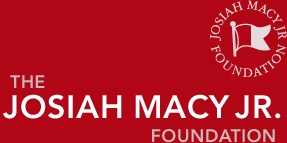
Earlier this month, Beverley Johnson, President and CEO of IPFCC, attended an intense, invitational working meeting of the Josiah Macy, Jr. Foundation.* The focus of the meeting was to develop a consensus on a set of recommendations for how “patients, families, and communities can be more effectively engaged in the process of redesigning both health care education and health care delivery…" Attendees included leaders in education of health care professionals—such as physicians, nurses, and other health care providers, researchers, professors, and senior executives from a variety of organizations, including academic medical centers, foundations, nonprofits, corporations, and the government—as well as several patient and family leaders.
Four organizations presented case studies: Université de Montréal, University of Rochester Medical Center, Veterans Health Administration, and Duke University. Highlights of two are below.
The Université de Montréal (UdeM), Partners in Interprofessional Education: Integrating Patients-as-Trainers, described the successful approach to integrate patients in interprofessonal education courses. UdeM believes in implementing "full partnership between patients and professionals” in the realm of education. At UdeM, patients are co-facilitators with health professionals in the training of students in 13 different health-related professions. Students report a positive impact of patients-as-trainers on their learning about partnership concepts, as well as changing their vision of partnership for their future practice.
The University of Rochester Medical Center (URMC) presented its Patient and Family Centered Care (PFCC) Initiative—and lessons learned from development, implementation, and sustainability. In May of 2010, IPFCC provided consultation and technical assistance to assist in hard-wiring this hospital-wide PFCC initiative.
URMC’s CEO, Dr. Bradford Berk’s personal experience—becoming a patient—and now living with a physical disability and chronic disease as a result of a cervical fracture compelled this change in organizational culture. Dr. Berk focused on “what’s important” including:
- Treating patients and families with dignity and respect;
- Expressing emotions such as compassion and caring;
- Valuing the patient and family as an integral part of the health care team; and
- Demonstrating attentiveness by taking the time to listen to patients and their families.
One goal in this case study included “educational approaches to further reduce the silos that exist between microsystems within …[the] larger health care macrosystem” and working to improve “interprofessional relationships” to move to a collaborative care model.
The goal of the Josiah Macy, Jr. Foundation meeting was “to get the input and perspectives from all the diverse conference participants in order to reach the consensus recommendations that will have the greatest impact.” The conclusions and consensus recommendations reached at the conference will be published in an Executive Summary, followed by a monograph of commissioned papers and proceedings.
*The Josiah Macy Jr. Foundation strives to foster innovation in health professional education and to align the education of health professionals with contemporary health needs and a changing health care system.
|
Do You Have Information About Patient and Family Participation in Interprofessional Education?
|
As a follow-up to Bev Johnson’s participation in the Josiah Macy Jr. Foundation meeting described above, IPFCC would like to gather more examples of how patients and families are involved in interprofessional education, in education for specific disciplines, and in community-based educational initiatives. If you are part of such a program, or if you know of any program, please let IPFCC know about it. Specific measurable outcomes are of particular interest. Contact institute@ipfcc.org to share a brief description.
|
Scholarship Recipients Share Insights and Experiences After Attending California Seminar
|
A special thanks to the 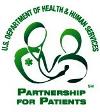 Partnership for Patients contractor, Weber Shandwick, for allocating resources for scholarships for a group of patient and family leaders/advisors from US hospitals to attend IPFCC’s recent Moving Forward with Patient- and Family-Centered Care Intensive Training Seminar in California. One of the requirements for those receiving an honorarium included writing a blog entry sharing their insights and experiences from the training. Partnership for Patients contractor, Weber Shandwick, for allocating resources for scholarships for a group of patient and family leaders/advisors from US hospitals to attend IPFCC’s recent Moving Forward with Patient- and Family-Centered Care Intensive Training Seminar in California. One of the requirements for those receiving an honorarium included writing a blog entry sharing their insights and experiences from the training.
Here is the blog entry by Carrie Kimel, Family Advisory Council Patient Advocate, Children’s Hospital of Georgia:
"I have to admit, I was very nervous as I entered the ballroom on the first day of the conference. I am just a patient advisor attending with physicians, nurses, social workers, and other highly educated people that are paid by their respective institutions. I honestly felt that I would get lost in the sea of people there. Before I knew it people were seeking me out, wanting to meet me, the patient advisor.
I am a volunteer who has a passion for helping patients and families get the best care possible. I am a mother and caregiver of a true hero, Zackary, who lost his childhood to battle cancer. I am a sister, niece, and a daughter-in-law that lost my family to cancer. It is not about my story, it is about dedicating my life to serve others.
Looking through the guide, you could not help but feel overwhelmed by the sheer amount of information the seminar contained. I quickly became childlike in that I was a sponge trying to absorb as much information as possible. When I arrived at the seminar, I was a timid advisor who was dedicated to the hospital that I serve. The seminar taught me confidence and the skills needed to be an effective advisor that will make a huge impact with the skills I now have. If you asked me to put a price on the information that was provided during the week, my answer would be priceless.
I will never forget hearing the patients and caregiver whom shared their stories. One was on her third heart, the other battled cancer while pregnant, and one had cystic fibrosis. A caregiver shared her journey of her husband’s illness and transplant. I cried hearing these stories and I realized how important PFCC is to the patient receiving care.
What does the word visitor mean to you? To me it sounds like I am in a prison waiting my turn to see an inmate. In the seminar, they spoke of tearing down those horrible visitor signs. I saw a hospital with beds in every room for the family member to stay. If only that was an option when I was in the ICU. If only my husband could have been there when I coded and spent countless days feeling alone unable to move or speak. We were military and had no choice. I will speak to the military hospital in hopes of reaching someone who will embrace PFCC.
Sadly, staff have stated that they fear doing their job because of PFCC. With the information, and the tools I now have I can teach the staff to embrace PFCC. I left with a passion to change the way that things are. Not only will I teach the staff; I have the ability to teach our medical, dental, and other schools that are associated with the hospital. After all, if we believe in something and are taught the proper way we will make a difference."
Read more reflections from other Seminar scholarship recipients.
|
|
In This Issue |
- The 6th International Conference Features Keynote Speakers Sir Liam Donaldson and Leilani Schweitzer
- Come to Vancouver Early and Stay Late
- IPFCC’s California Seminar A Great Success!
- Save the Date! ~ IPFCC's Next Intensive Training Seminar in Cambridge, Massachusetts
- Engaging Patients, Families, and Communities to Link Interprofessional Practice and Education
- Do You Have Information About Patient and Family Participation in Interprofessional Education?
- Scholarship Recipients Share Insights and Experiences After Attending California Seminar
- Patient and Family Engagement Initiative from the Canadian Foundation for Healthcare Improvement
- Health Care Leaders and Advocates Call for Patient- and Family-Centered ‘Revolution’ In Medical Education
- Family-Centered Care for the Newborn ~ The Delivery Room and Beyond
- Having Trouble Receiving Pinwheel Pages?
|
Patient and Family Engagement Initiative from the Canadian Foundation for Healthcare Improvement
|

Canadian Foundation for Healthcare Improvement (CFHI) announced a new initiative, Partnering with Patients and Families for Quality Improvement—a “pan-Canadian collaborative that will bring together Canadian healthcare organizations to harness the tremendous potential of patient and family engagement to drive quality improvement in healthcare.”
CFHI will provide funding, coaching, and support to Canadian health care organizations and ministries to build capacity and drive quality improvement by partnering with patients and families, providing funding of up to $50,000 each to a maximum of 15 participating teams.
The 17-month collaborative is open to
teams from organizations committed to involving patients and families in
designing, delivering, and evaluating health care services with the
goal of better patient outcomes.
The application deadline is May 29, 2014, or when the program reaches capacity.
Read the Prospectus.
CFHI is a Program Partner for the upcoming IPFCC International Conference. Several CFHI funded projects will be presented at the Conference. For more information about the International Conference see article above or go to IPFCC’s website.
|
| Health Care Leaders and Advocates Call for Patient- and Family-Centered ‘Revolution’ in Medical Education |

A new article, first published online April 22, 2014 in Annals of Internal Medicine, Patient- and Family- Centered Medical Education: The Next Revolution in Medical Education?, calls for the revamping of medical education, working collaboratively with patients and family advisors and leaders in design and implementation. “Patients and families can provide invaluable insights and perspectives for changing and improving physician training programs,” says lead author Steven E. Weinberger, MD, FACP, Executive Vice President and Chief Executive Officer of the American College of Physicians (ACP).*
Partnering with patients and families is recognized as an essential component of high value health care, a key initiative for ACP and many other medical organizations. However, the system of medical education has been slow to embrace this partnership.
The needs, preferences, goals, and concerns of patients should be included in clinical and educational discussions and in office notes. Physicians can start by following established guidelines for promoting active participation of patients and families into their medical care.
Co-authors, Beverley H. Johnson, President and CEO of the Institute for Patient- and Family-Centered Care and Debra L. Ness, President of the National Partnership for Women & Families, agree that transforming physician training programs to incorporate a patient- and family-centered 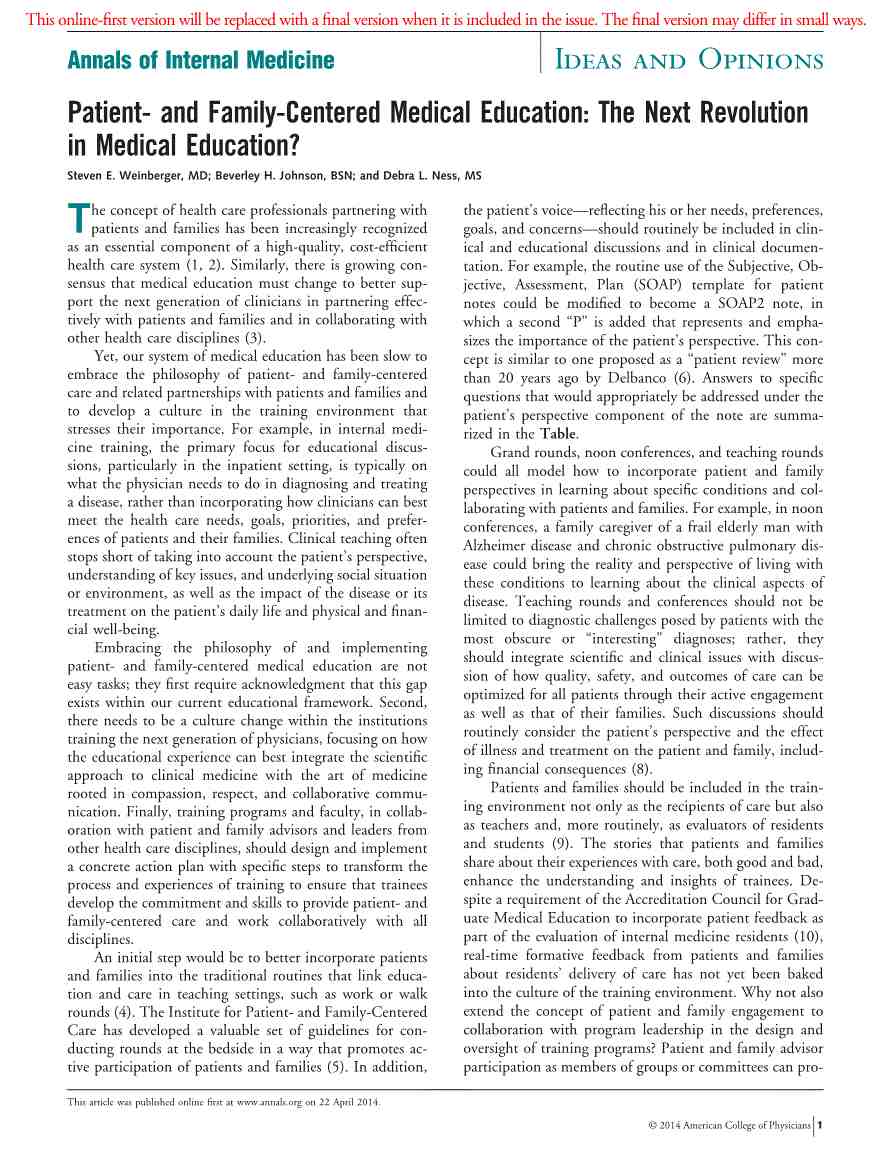 component will take work. Conversion will require acknowledging the issue, enacting a cultural change, and designing and implementing an action plan. component will take work. Conversion will require acknowledging the issue, enacting a cultural change, and designing and implementing an action plan.
The authors conclude, “For our healthcare system to provide truly patient- and family-centered care, we must change the culture of the training environment as well as the expectations of both trainees and faculty to understand and address patient and family perspectives. This potentially represents a revolution in our approach to medical education, but it is certainly one that is worth addressing if we are to best meet the needs of patients and families.”
*The ACP is the nation’s largest medical specialty organization and second-largest physician group. |
Family-Centered Care for the Newborn ~ The Delivery Room and Beyond
|
Just ann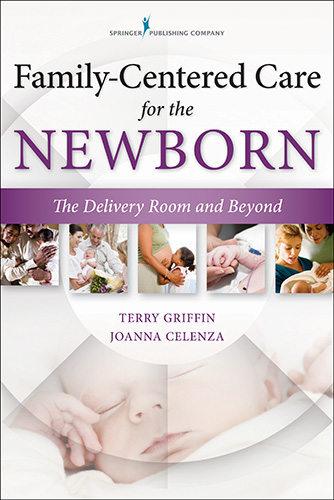 ounced: April 2014 release of the new book, Family-Centered Care for the Newborn ~ The Delivery Room and Beyond (Springer Publishing) which provides a comprehensive guide to ounced: April 2014 release of the new book, Family-Centered Care for the Newborn ~ The Delivery Room and Beyond (Springer Publishing) which provides a comprehensive guide to
family-centered care for healthy, ill, or preterm newborns.
The authors are Terry Griffin, a Clinical Nurse Specialist in the Neonatal Intensive Care Unit at St. Alexius Medical Center, in Chicago, and a long time faculty member of IPFCC, and Joanna Celenza, a Family Support Specialist at Children’s Hospital at at Dartmouth(CHaD) Intensive Care Nursery, Dartmouth-Hitchcock Medical Center and an active member of the CHaD ICN Parent Council and Family Advisory Board.
This book guides health care professionals in creating, supporting, and advancing a culture that values partnerships with families. Included are practical suggestions and strategies for effectively communicating with families, and best practices for health professionals who wish to develop partnerships with families before and after childbirth.
Additionally, the authors reflect on the power of language used with and about families. They also include tips on policy review to foster and support a culture of family-centered care, discuss how to welcome families during interdisciplinary rounds and nurse hand-offs, and offer ways to support families during procedures and resuscitation.
|
|
Having Trouble Receiving Pinwheel Pages?
If
you or your colleagues are having
trouble receiving the e-newsletter, and you had already signed up to
receive it, please
check your spam or junk mail filter.
Still having problems? Cvent
recommends that you or your computer
administrator update your white-list
to include the following Cvent
domains: cvent.com, cvent-planner.com,
and cventmail.com. Please contact us if you or someone you know continues to have problems
with receiving Pinwheel Pages.
|
Links |
|
|
Previous Issues |
|
|
About Us |
Founded in 1992 as a nonprofit organization, the Institute for Patient- and Family-Centered Care works to advance the understanding and practice of patient- and family-centered care in all settings where individuals and families receive health care.
|
|